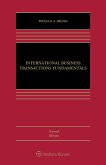In a market environment where economic actors conduct themselves as diligent and conscientious managers, the regulation of related party transactions (RPTs) would be largely irrelevant. Unfortunately, the corporate reality is far from an ideal world that is innocent of market abuse and corporate fraud. It remains necessary to protect minority shareholders from the wrongdoings of majority shareholders and to protect all shareholders from opportunistic managerial behaviour. This timely book the first on the subject since implementation of the European Union's (EU's) revised Shareholders' Rights Directive provides in-depth analysis of how and to what extent RPTs are covered by existing legal requirements on capital protection and corporate group regulation, highlighting experiences and strategies adopted in Germany, Poland, and the Netherlands as examples for Eastern European countries and in particular Ukraine. Beyond his comparative analysis of the current status, the author offers recommendations for more effective handling of RPTs, investigating such aspects as the following: what constitutes a corporate group and how group issues are regulated in the various legal systems; what constitutes a conflict of interest originating in ownership and control and what types of such conflicts occur; whether RPTs within corporate groups should receive special treatment relative to transactions outside groups; combatting corporate raiding, most often carried out through illegal seizure of corporate assets; approval and disclosure requirements for RPTs; and how information about RPTs is disclosed publicly. Drawing on resources including legislation, case law, scholarship, and intensive discussions with practicing lawyers from several jurisdictions, the author underscores the imperative of establishing limitations and requirements that oblige a company's officers, shareholders, and other potential related parties to follow certain rules whenever they wish to enter into an RPT. As a contribution to the debate about the convergence between EU corporate law and that of major eastern European states, the book has no peers. Practitioners in both East and West who advise on compliance with regulations for RPTs or represent stakeholders' interests against abusive RPTs will ensure appropriate remedies and protection mechanisms for their clients.
Dieser Download kann aus rechtlichen Gründen nur mit Rechnungsadresse in A, B, BG, CY, CZ, D, DK, EW, E, FIN, F, GR, HR, H, IRL, I, LT, L, LR, M, NL, PL, P, R, S, SLO, SK ausgeliefert werden.









